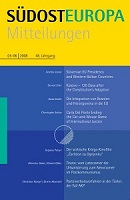Islam und religiöse Autorität im heutigen Albanien
Islam and Religious Authority in Today’s Albania
Author(s): Cecilie EndresenSubject(s): Geography, Regional studies, Islam studies, Politics and religion, Sociology of Religion
Published by: Südosteuropa Gesellschaft e.V.
Keywords: Albania; Islam;
Summary/Abstract: How do ‘new’ and ’old’ Islamic actors in contemporary Albania define religious authority and legitimacy? This contribution uses Olivier Roy’s analytical distinction between accommodation and neo-fundamentalism to explore different Islamic approaches in Albania.Accommodation means that the bond between religion and a specific territory and culture of origin is tight. In this context, ‘culture’ refers to Albanian historical tradition and the language based,secular nation-building project. Neo-fundamentalism, conversely, is a globalised form of religion that emphasises the gap between faith and culture. As such, it represents a re-formatted,exportable form of religiosity, which stands in contrast to cultural ethno-national ways of being a Muslim.The article applies this analytical distinction to explore different sets of religious authority promulgated by a selection of Islamic groups. Two examples of accommodation are the Muslim Community of Albania, which represents ‘official Islam’ and ‘mainstream’ Sunni Muslims, anda Halveti Sufi subgroup. As a neo-fundamentalist counterpoint, the paper explores the ideas of a competing organisation composed of Salafi imams, the Albanian “League of Imams”.
Journal: Südosteuropa Mitteilungen
- Issue Year: 2017
- Issue No: 01
- Page Range: 60-69
- Page Count: 10
- Language: German
- Content File-PDF

